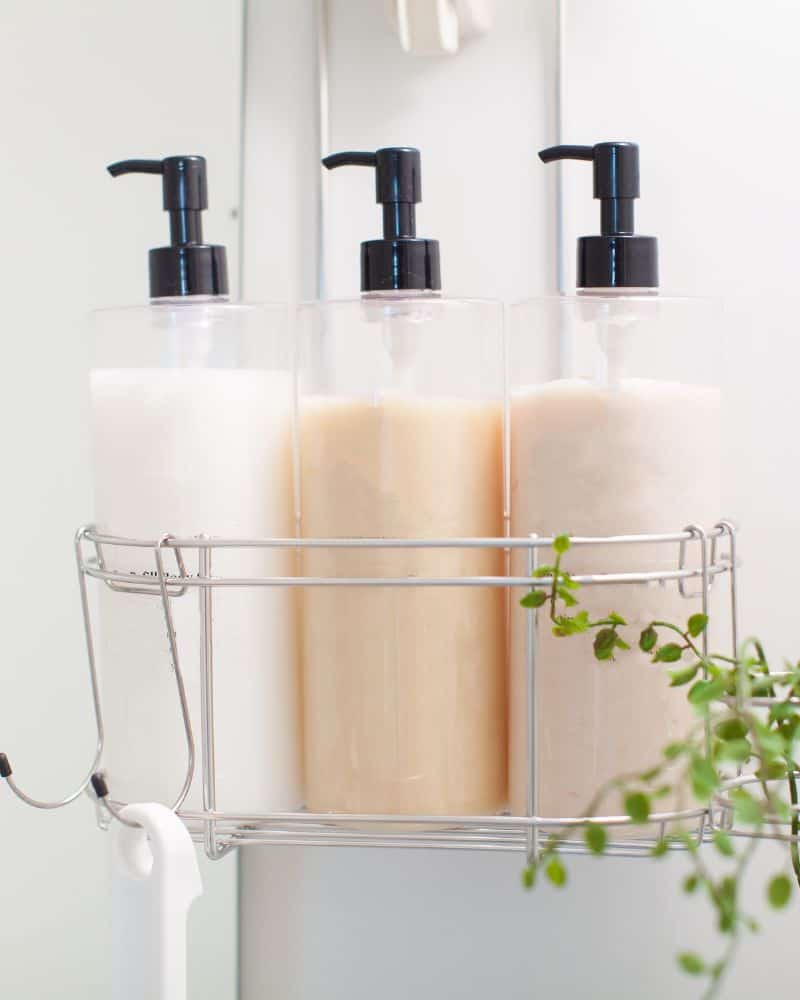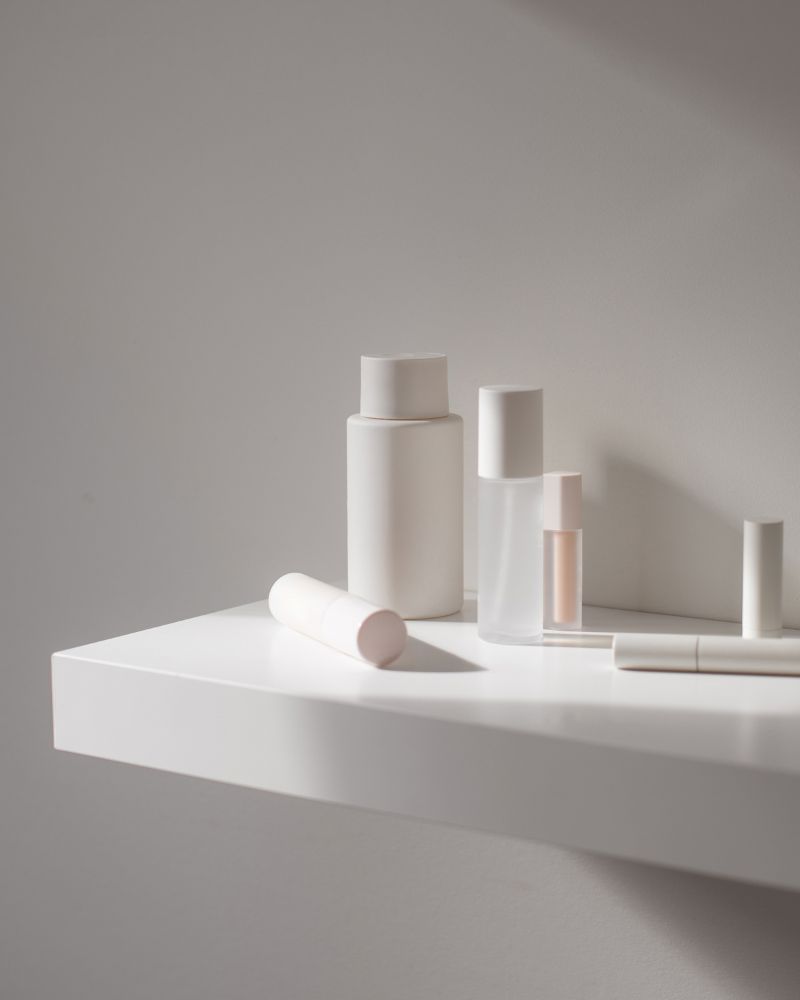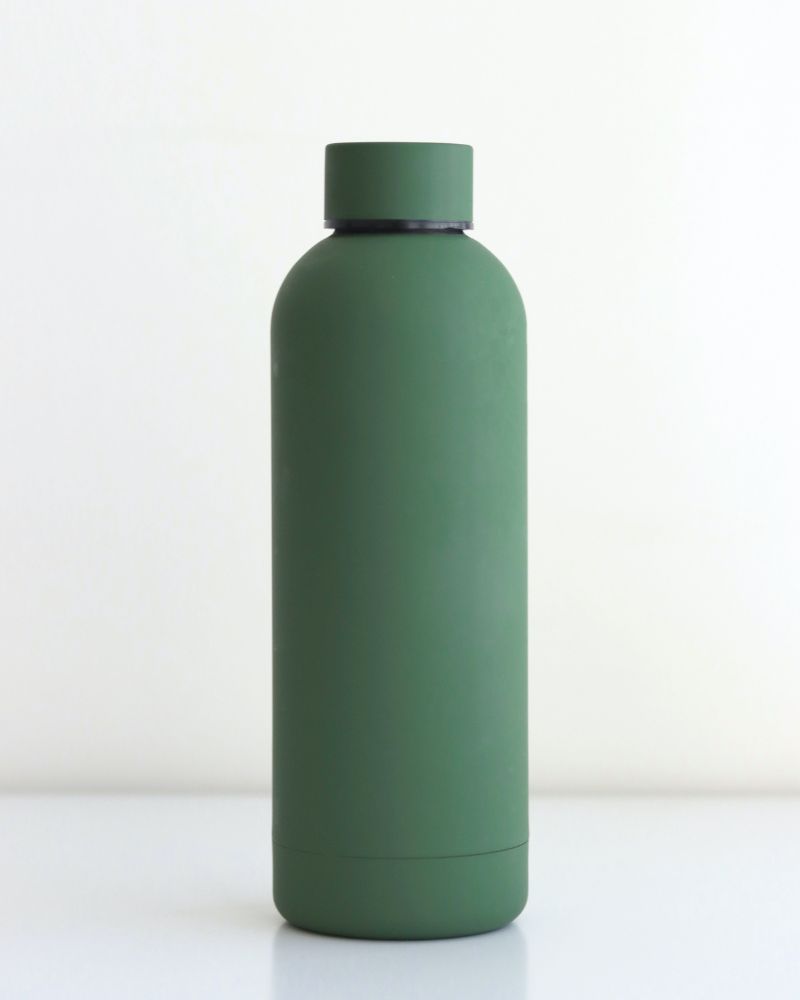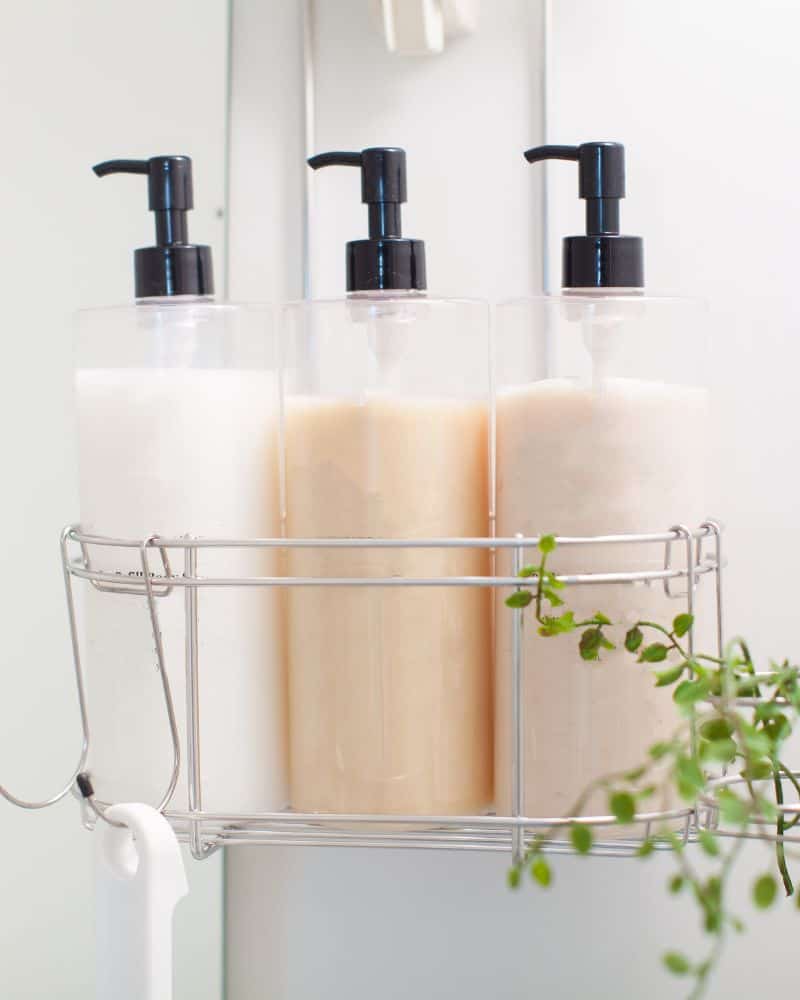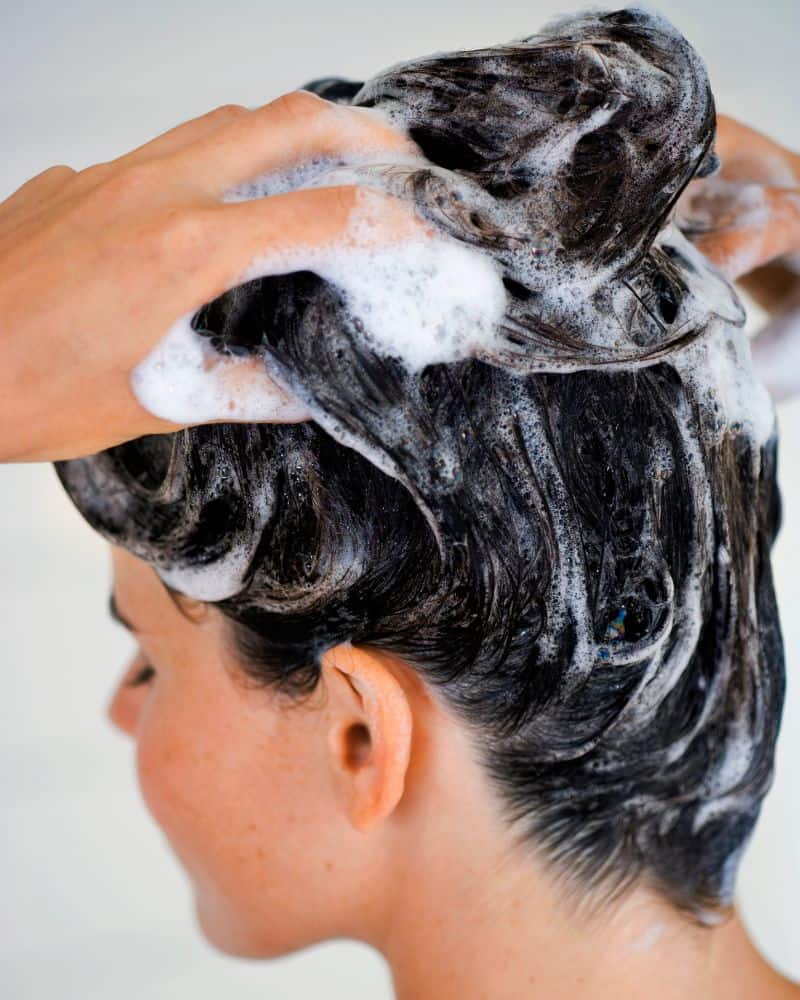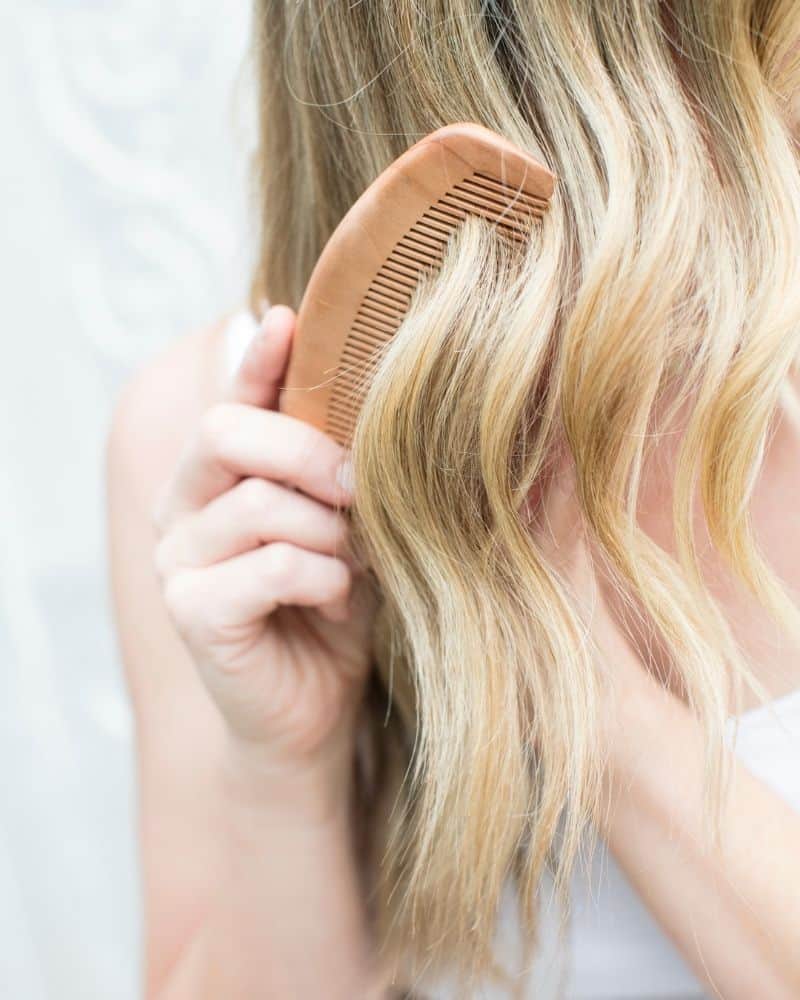Is Pantene Bad For Your Hair?
This post may contain affiliate links.
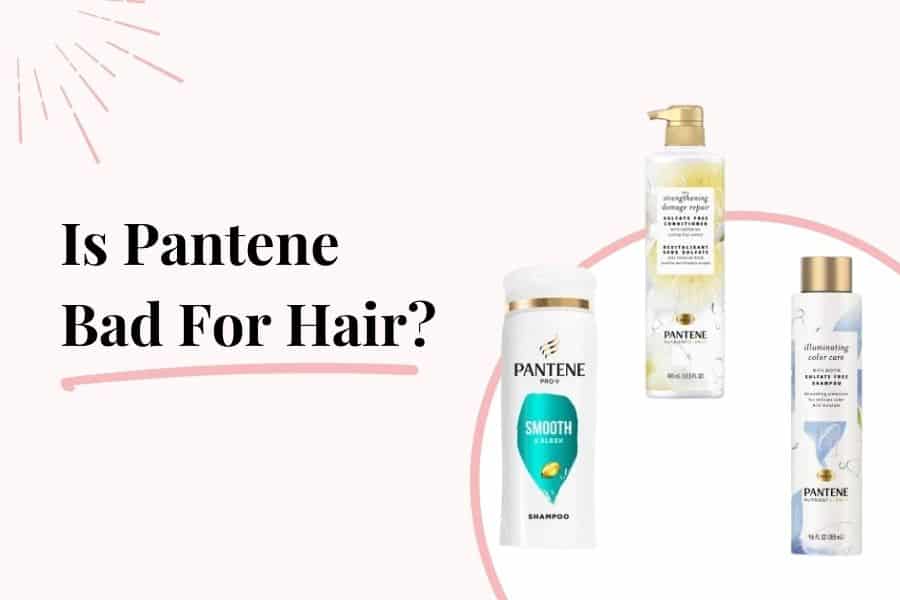
Pantene is among the most famous drugstore brands of hair care products. Their line of products is worth 4.75 billion dollars, and it’s easy to see why. They’re cheap, accessible and have a wide selection of products for varying hair types. But in recent years, Pantene has faced allegations of unsafe ingredients, plastic build-up, and even accusations of their products causing a woman’s hair to burn off have damaged Pantene’s reputation. It’s common to hear stories of discouraging the use of Pantene to their clients. We must ask ourselves: Is Pantene bad for your hair?
Although every woman wants their hair to look like those Pantene commercials – thick, bouncy, glossy and gorgeous, is that really what we’re getting?
We’ll take a look at the brand ’s history, their ingredients and what women are saying about the products to decide if Pantene is really bad for your hair.
About Pantene
Swiss scientists developed the Pantene product line in 1945. Produced by drug manufacturers Hoffman LaRoche, their breakthrough involved using panthenol or Vitamin B5. This ingredient was initially used in hospitals to treat burn victims, but the drug company saw its potential in restoring damaged hair. The products were a hit in Europe, and demand eventually brought them across the pond to the United States.
Through the years, Pantene grew a stellar reputation and many high-end brands sponsored them. The bottles’ gold caps made them easily recognizable on shelves and gave them an air of luxury.
Eventually, their line expanded to a variety of products for all sorts of hair types and treatments. Their advertising was effective and glamorous. The company stirred controversy when it released the tagline “Don’t hate me because I’m beautiful,” which was deemed narcissistic by critics.
Today, Pantene’s brand can be summed up as hair care for the everyday woman backed up by science. They tout their Swedish pharmaceutical roots, along with their current team of chemists, and urge customers that their formulas are backed up by data and years of experimentation.
Over the past decade, Pantene has lost a lot of its luster. It’s now associated with cheap drugstore ingredients that will only damage hair over time. Despite this, Pantene remains an institution in the beauty world.
The Sky’s the Limit With Pantene Products
Pantene has ads featuring every hair type under the sun—from pin straight to kinky curls. Their best-selling line is also their most basic: the Daily Moisture Renewal shampoo and conditioner. They’re also famous for their namesake, the Pro-V collection, that touts the benefits of vitamin B5, biotin, and antioxidants while promising nourished, smoother, and stronger hair.
There are collections for everything hair has to throw at a person; if your hair is damaged, then the Miracle Rescue collection or the Repair and Protect collection may be something you’ve researched. You might have reached for the Radiant Color line if you have dyed hair.
Over the years, Pantene and many other beauty brands have noticed the the natural hair movement can offer. They have not one but two collections catering to textured hair. The Gold and the Truly collections provide moisture and strength to curly hair.
No wonder Pantene has been so popular with existing name recognition and a massive line of products. Popularity will always be a double-edged sword; with more attention, there will always be more scrutiny. With how protective women can be about their beauty routines, it’s not surprising that Pantene has become a target—whether it’s warranted or not.
Pantene Product Ranges
Pantene has quite the collection under their belt with 10 different collections tailored to specific hair types and hair concerns.
- Nutrient Blends Collection – designed to nourish, protect, and strengthen the hair. The collection features a range of shampoos, conditioners, and styling products that are parabens, dyes and mineral oil. This is one of their more natural lines and also has sulfate-free shampoos
- Miracle Rescue Collection – helps to repair damaged and brittle hair. The collection includes a shampoo, conditioner, and leave-in treatment, all formulated with Pantene’s Pro-V nutrient blends. The products are designed to help repair damage from heat styling, chemical treatments, and everyday wear and tear.
- Gold Series Collection – one of their most expansive lines tailored for relaxed, natural or transitioning curly hair to strengthen and moisturize for healthier hair. The line features shampoos, conditioners, leave-ins, treatments, styling products and more.
- Truly Collection – designed to nourish hair with jojoba and coconut oil to hydrate and protect hair. This line features shampoos, conditioners, styling products and treatments for relaxed and curly hair
- Repair and Protect Collection – formulated for damaged hair, this line claims to repair 6 months worth of damage with one thanks to the amino acid Histidine that works deep inside the hair to repair damage and strengthen hair to prevent future damage
- Generation Beauty Collection – a line of products designed for every age and stage of your hair. From oily roots to silver strands, this line is tailored for your hair needs at every age.
- Daily Moisture Collection – designed to provide intense hydration and nourishment to dry, damaged and color-treated hair. It features lipids, antioxidants and amino acids to strengthen and rebuild split ends and broken bonds in the hair.
- Waterless Collection – range of hair care products designed to give you all the benefits of shampoo and conditioner without the need for water. The collection includes cleansing mousses and sprays, conditioning sprays, shine mists, refreshing spray and a dry oil
- Volume & Body – designed for those wanting thicker, fuller looking hair. It helps to keep hair looking bouncy and voluminous.
So is Pantene a good brand? Having a wide range of products suited for every hair type certainly gives Pantene a plus in my book. But let’s keep going.
Combing Through Pantene’s Controversies
In recent years, Pantene has been deemed “bad for hair” by stylists and beauty bloggers. There are many issues stemming from the ingredients used in their products. Allegations of carcinogens, plastic, allergens, and harsh chemicals are present in many blogs and articles upon a Google search. One lawsuit accused Pantene of “misleading advertising” because the ingredients were allegedly synthetic instead of all-natural like their ads claimed. A judge threw out this lawsuit since, according to them, no reasonable person would look at a Pantene advertisement and think the ingredients were completely natural.
One of the most severe claims was when a client getting her hair colored had her hair practically catch fire when Pantene mixed with the stylist’s products. While experts rebuffed that claim, it—and other pending lawsuits—warrants a deep dive into Pantene’s ingredients.
Lifting the Cover Off Pantene’s Labels
To get to the bottom of whether Pantene is a particularly bad brand or if the hype is overblown, it’s essential to look at the label and research the ingredients. Now, when you look at a label, your eyes may slowly glaze over when you reach the second jumble of letters in the shower. Luckily, there are tools you can use to check the ingredients to see if they are safe or curly girl-friendly.
While the ingredients in hair care products seem like complete gibberish, they all tend to fall into these categories:
- Surfactants: these include sulfates like sodium lauryl sulfate and also non-sulfate varities for their sulfate-free range of products. Surfactants are what make products foam and help to cleanse the hair of any buildup of dirt oil or product
- Emollients: these ingredients make sure the hair is hydrated and moisturized. Some examples include jojoba oil, shea butter, and coco butter
- Humectants: these help to keep the moisture in your hair by drawing water from the environment. They’re often used in leave-in conditioners and styling products. Glycerin, honey and aloe vera are all examples of humectants
- Proteins: mino acids or silk proteins are commonly found in haircare products. This is often added to conditioners and treatments to help rebuild the hair shafts that may be damaged. Hydrolyzed wheat protein is a common form of protein used in Pantene products
- Vitamins: these can be either water or fat-soluble and help to nourish the scalp. Niacin, biotin, and panthenol (a form of vitamin B5) are often seen in shampoos and conditioners
- Antioxidants: these help to protect the hair from environmental damage. Vitamin C and green tea are two common antioxidants used in haircare
- Plant Extracts: like Rosewater, these can provide the hair with much-needed nutrients. Although these types of ingredients are mainly found in Pantene’s Nutrient Blends collections and not so much in their other lines
- Emulsifiers: these help to keep all the ingredients in a product mixed together so that they don’t separate. A common emulsifier is polysorbate-20
- Fragrance: this is what makes a product smell nice. Often, these fragrances are synthetic
- Chelating agents: these help to remove any build-up on the hair from minerals in water. Disodium EDTA is a common chelating agent used in Pantene products
- Parabens: these are preservatives that help to extend the shelf-life of a product. Methylparaben and propylparaben are two common parabens used in Pantene products
- Preservatives: these help to prevent the growth of bacteria and mold in a product. Phenoxyethanol is a preservative often used in Pantene productsSo, Are Pantene’s Ingredients Safe?The ingredients in Pantene’s shampoos and conditioners are generally considered safe. However, there is some controversy surrounding a few
The first ingredient that puts Pantene on a lot of people’s “To Avoid” list is silicone. Silicones are responsible for giving hair that silky feeling and can help to reduce frizz. However, they can also build up on the hair over time and be difficult to wash out. This can lead to dull, lifeless hair.
While some people choose to avoid silicone altogether, others have no problem using products that contain it as long as they are sure to use a clarifying shampoo every few washes. It’s something that comes down to personal preference.
Many Pantene products contain a variety of silicones such as dimethicone. Silicones are meant to create a barrier to protect the hair from humidity and heat while adding softness and shine. There are two types of silicone; insoluble and soluble that can be easily washed out.
While silicone is harmless to the human body, it can cause issues depending on your hair type. For one, locking moisture out over time may dry out your hair. Another problem is that, especially if the silicone is non-soluble, it will build up on the hair and scalp, weighing down the hair and irritating the scalp. This has made silicone a no-go in the curly hair community and it’s also fallen out of favor with most beauty gurus.
This is where Pantene’s reputation for having plastic or wax comes into play. While they’re not present on any of Pantene’s ingredients list, the build-up that silicones cause has been described as ‘waxy’ and ‘plasticy.’ Many people take these descriptions and conclude that synthetics are melting into their hair and destroying it. Wax is also not unheard of in a few formulas; emulsifying wax is typical in many natural brands and helps to keep formulas stable and make a product feel luxuriously thick.
One ingredient that gets a lot of brands in trouble is sulfates; in Pantene’s case, it’s sodium lauryl sulfate. This is a cleanser and meant to encourage lathering of the shampoo to create those satisfying suds. Unfortunately, it can be harsh and cause scalp irritation, strip hair color and moisture from the hair.
It’s an ingredient in many of Pantene’s flagship products, though certain products advertise a sulfate-free formula. Worst of all, they’re high up on the ingredients list. They’re a significant portion of the formula.
The ingredient category that’s probably the most significant sticking point is preservatives. These are in our products to keep them from growing bacteria and fungi in our shower’s warm and humid environment. Currently, Pantene seems to be fond of methylisothiazolinone to preserve their products.
While it’s milder than the alternatives, it can still be a nightmare for people with allergies and sensitive skin. DMDM hydantoin, a formaldehyde releaser, can still be found in a few of Pantene’s mousses. This is not formaldehyde like many bloggers suggest; it instead releases formaldehyde (semantics aside, it is important to be accurate). While formaldehyde is tied to increased cancer rates, there’s still research to be done on the effects of DMDM hydantoin.
Preservatives are also where dreaded parabens make an appearance. These have been loosely tied with breast cancer and endocrine disruption. While the evidence is still a bit flimsy, one study found parabens in breast tissue, so they can accumulate in the body at the very least. Whether or not that can lead to disease remains to be seen.
Parabens also tend to hang out in the environment. Studies have shown that parabens can pass from showers into drains and finally be released into the environment. While there are ways to chemically degrade them when passing through water treatment plants, studies do still show them present in the environment.
While scientists have not confirmed the exact effects of parabens, Pantene and a lot of brands are moving away from them altogether. The negative press is driving a search for alternative preservatives and giant stickers reading “Paraben Free.” If they are present at all, they are in small quantities.
There are even chemicals not on the label that have landed many brands in hot water. In 2021, a huge class-action lawsuit was filed across multiple companies—selling everything from shampoo to sunscreen to deodorant—due to the discovery of benzene impurities in aerosolized products. Benzene is a carcinogen that can lead to leukemia, lymphoma, and multiple myeloma, among other things. Pantene dry shampoo was on that list, and millions of products have been recalled across the country.
Related post: Is Head And Shoulders Good Or Bad For Hair?
Ingredients In Pantene That Are Bad For The Hair
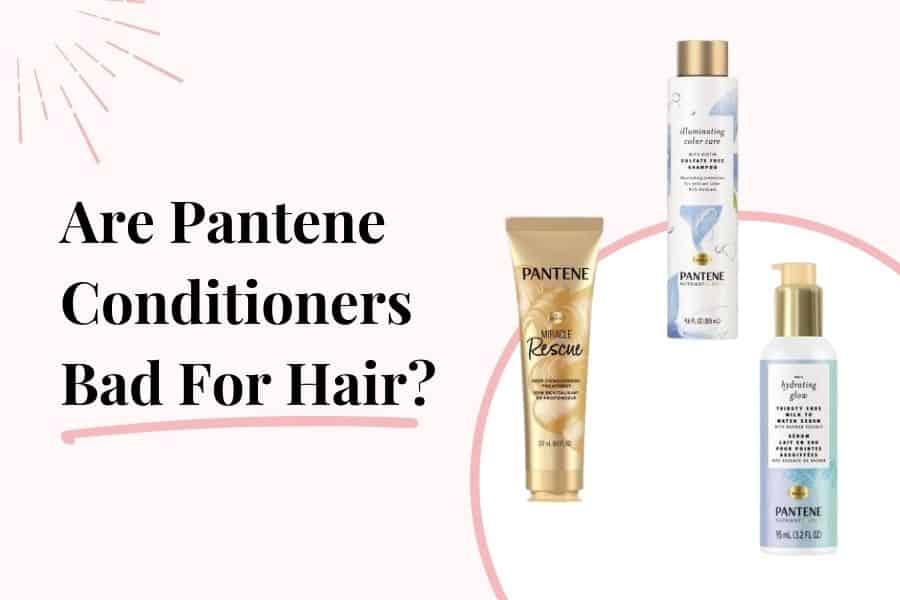
The ingredients in Pantene’s products are mostly good for your hair. However, there are a few that can be harsh and cause issues, not to mention health problems.
Here are a few ingredients that raise red flags:
- Sulfates – Sulfates are harsh detergents that strip the natural oils from your hair, leaving it dry and brittle. They can also cause irritation and itching.
- Silicones – Silicones are synthetic polymers that coat the hair, giving it a slick, smooth feeling and lots of shine. However, they can build up on the hair, clogging the scalp and preventing moisture from entering the hair shaft. This can lead to dry, brittle hair that is prone to breakage.
- Parabens – Parabens are preservatives used in many hair care products. They can be absorbed into the skin and accumulate in the body, leading to potential health risks.
- Preservatives – Preservatives are used in many hair care products to prevent the growth of bacteria, mold, and yeast. However, some preservatives can be irritating to the skin and cause scalp irritation.
These harmful ingredients in Pantene’s products certainly raise a red flag to many consumers. With so many natural brands popping up everywhere, it’s no wonder Pantene has created more natural products in recent years.
So Is Pantene Bad For Your Hair?
Are the rumors true or is Pantene good for hair and is just suffering some unfortunate bad press?
The answer is… maybe? It’s not a satisfying answer, but there are many things to consider. Not every Pantene product is the same. Some are advertised as silicone, paraben, and sulfate-free, while others aren’t. Some people may not be as sensitive to stronger chemicals in their products—not to mention all the hair types and what they can tolerate.
The sulfate, silicone and paraben free lines generally have pretty good ingredients, although they do still contain preservatives, which is necessary to keep the product fresh.
The Pantene shampoo ingredients in their main collections are not the best and all contain sulfates among other potentially harmful ingredients. The high concentration of sulfates and other harsh chemicals are two main disadvantages of Pantene shampoos.
While most of the conditioners are generally pretty great (aside from having silicones).
While there are problematic ingredients in a few of their products, this is not an issue exclusive to Pantene. The harsh chemicals and potential carcinogens are present in most drugstore products such as Dove, Garnier, Old Spice, and many others.
What you should do is take Pantene’s claims with a grain of salt and listen to your scalp and hair. If you type in most of Pantene’s products into CurlsBot, most of their products are not actually curly girl approved despite advertising to the contrary.
When looking at blogs and what to buy, you must remember that beauty can suffer from gatekeeping, especially regarding hair. Every blogger, TikToker, and forum member has an opinion on what’s good and bad for hair based on their specific routine. Thus, there’s a lot of conflicting advice that ignores one simple fact: Everyone’s hair is different! Even hair with similar textures can behave differently from one another.
If your hair feels good after using Pantene and your hairdresser isn’t alarmed by your hair’s state when you come in for a cut, by all means, keep using it. Yes, that includes curly girls.
If you like the brand, but your scalp is getting build-up and your hair feels weighed down, switch to a silicone-free product or add a clarifying shampoo. If the routine that works for you is from a drugstore, there’s nothing wrong with that! So long as your hair looks good, use the products that make you feel your best.
Why Is Pantene So Bad For Your Hair?
So what is the problem with Pantene products?
The claim that Pantene is bad for your hair has been circulating for years. One of the reasons comes down to ingredients. Many of Pantene’s products contain ingredients that just aren’t good for the hair and also contain some questionable ingredients that are potentially harmful to your health.
However, this is not exclusive to the Pantene brand, as most other drugstore and even high end hair care products also contain these harmful ingredients.
Is Pantene Good For Your Hair?
Pantene is a best-selling drugstore haircare brand for a reason, despite the negative press they have been getting recently. And while not all Pantene products are formulated well, they do have some really great lines and products in their collections.
It’s Affordable
One of the biggest selling points of Pantene products are that they’re super affordable! You can buy an entire haircare line for under $50. It’s also accessible and can be bought at any major retailer and drugstores. These two reasons make it an ideal brand for most.
Pantene Has Tailored Products For All Hair Types
Pantene has 10 different collections that each have shampoos, conditioners, treatments, styling products and more. Each collection is tailored for specific hair types or hair concerns. Whether you have flat, limp hair or chemically damaged hair, Pantene has a product for you
Pantene Uses Well Researched Ingredients
Another huge plus is that Pantene uses some amazing ingredients, particularly in their Nutrient Blends, Generational Beauty and Truly collections.
These collections feature ingredients like coconut oil, jojoba oil, castor oil, rice water, biotin and more. All of these ingredients have been well-researched and documented to be beneficial for the hair.
Their other collections feature Pantene’s patented Pro-V Blend which contains, lipids, antioxidants, Vitamin B5 as well as other plant extracts. These ingredients help to nourish, repair and strengthen hair for optimal hair health.
Pantene’s team of scientists and experts are dedicated to creating safe and effective products. They analyze each ingredient carefully before including it in one of their products.
Does Pantene Cause Hair Damage?
While everyone’s hair is different, and some people may be able to use Pantene without any issues, the fact is that yes, Pantene can cause hair damage. This is because Pantene’s products contain harsh chemicals that can strip away the natural oils from your hair, leaving it dry, brittle and prone to damage and breakage. .
Does Pantene Cause Hair Loss
There is no solid evidence that using Pantene causes hair loss. However, there have been many rumors and claims from consumers that Pantene caused hair loss and their hair to fall out. While there is no scientific evidence to back up these claims, it is possible that the harsh chemicals in Pantene’s products could contribute to hair loss. If you are concerned about hair loss, it is best to consult with a doctor or dermatologist.
Is Pantene Bad For Your Hair FAQ’s
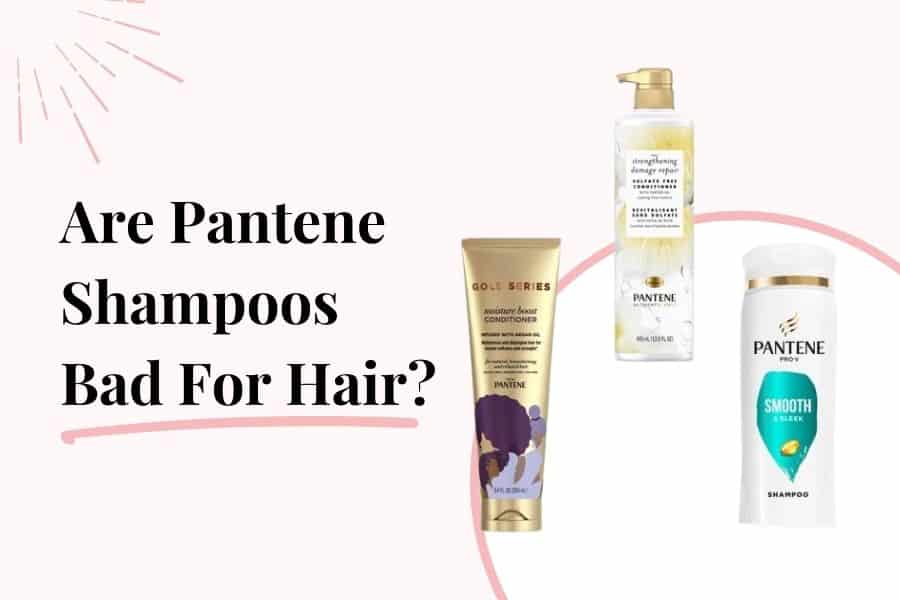
Why Is Pantene The Worst Shampoo?
It’s no secret that Pantene is not one of the best shampoos for your hair, but does that mean it’s the worst?
Pantene is not necessarily the worst shampoo, but it is definitely not the best. One of the reasons why Pantene is not the best is because their products contain harsh chemicals and ingredients that tend to dry out the hair, leaving it prone to breakage.
Ingredients like sulfates, silicones, parabens and more are commonly found in Pantene’s products and are known to cause damage to the hair.
Is Pantene Bad For Curly Hair?
While there is no one definitive answer, Pantene is generally not considered to be good for curly hair. This is because many of their products contain ingredients that can strip away the natural oils from your hair, leaving it dry and brittle. In addition, their products often contain sulfates which can be harsh on the hair and strip away the moisture.
And when it comes to curly hair, moisture is key for bouncy curls. The ingredients in Pantene’s shampoos and conditioners especially are not great for curly hair. These ingredients can even start to affect your curl pattern if used long enough.
Does Pantene Have Sulfates And Parabens?
Pantene is not a sulfate or paraben-free brand. While Pantene does have ranges of haircare products that are sulfate-free, paraben-free and silicone-free, many of their products do still contain these ingredients so you need to double check the ingredients list before purchasing.
Does Pantene Have Silicones?
Yes, some Pantene products contain silicones, but they’re Nutrient Blends collection features several silicone-free products.
Is Pantene Conditioner Good For Your Hair?
Pantene conditioners are a little better than their shampoos because they don’t contain any sulfates that strip the hair. Many of their conditioners contain good ingredients like oils, antioxidants and humectants to nourish, moisturize and hydrate the hair.
Many of their conditioners also contain silicones which are not the worst, per say. Many people prefer to use silicone free-conditioners because they can 1. weigh down the hair and 2. coat the hair and prevents hydration, moisture and nutrients from entering the hair shaft, which can lead to dry, brittle and unhealthy hair.
Although it’s a personal preference when it comes to silicones vs silicone free conditioners. Pantene does offer a range of silicone-free products.
Bottom line – Pantene conditioners are generally not bad for hair and they also offer some pretty good silicone-free options if you prefer to avoid those.
Is Pantene Shampoo Good For Hair?
So if you’re wondering is Pantene a good shampoo brand, then the answer is yes for the most part.
While most of the Pantene shampoos are not the best for your hair, their Nutrient Blends line is actually really good. It’s sulfate free and contain lots of great ingredients like plant extracts, antioxidants, humectants and emollients to gently cleanse and nourish the hair.
Is Pantene Bad For Colored Hair?
Pantene is generally safe for colored hair. However, it is best to use products specifically designed for color-treated hair to help maintain its vibrancy for as long as possible. It’s also a good idea to avoid sulfates and go sulfate-free as they can strip your hair of its color pretty quickly.
Is Pantene Pro-V Good For Your Hair?
The Pantene Pro-V blend features nourishing lipids, antioxidants, vitamins and other nutrients designed to strengthen and nourish hair. This iconic blend is featured in most of their products. Any of the products that contain the Pro-V blend are great for the hair.
Does Pantene Have DMDM Hydantoin?
DMDM Hydantoin is a preservative that is found in many skincare and haircare products. It’s become a controversial ingredient recently because it’s known to be a formaldehyde releaser, which means that this ingredient slowly releases formaldehyde throughout the products shelf life. This is concerning because formaldehyde is known to cause skin and respiratory irritation and it’s also been linked to certain cancers.
Luckily, Pantene does not list DMDM Hydantoin on any of its ingredient labels, which is a huge relief. Many people are mistaken that Pantene has this ingredient in it, but rest assured, Pantene products are free of DMDM Hydantoin.
Is Pantene Bad For Your Hair Conclusion
So is Pantene bad for your hair? Overall, Pantene is not the worst brand out there and their more natural lines that are sulfate and silicone free are actually pretty good in terms of ingredients. Some of the ingredients like sulfates, silicones and parabens are bad for your hair and health. However, they also have good ingredients like oils, plant extracts and humectants which help to keep hair healthy. If you’re concerned about these ingredients, look into their Nutrient Blends collections, which are generally good for the hair. These do still contain preservatives but you’d be hard pressed to find any haircare products without them because they would go back very quickly with no preservatives. In the end, it’s up to you whether you want to use Pantene or not. Many people use Pantene with no issues and as long as your hair is healthy, there is no harm in continuing to use Pantene.
